Self-Defense Tip #1
Below is a diagram of a vital self-defense technique, certain to be of use should you ever be threatened: the Twisker Sock.
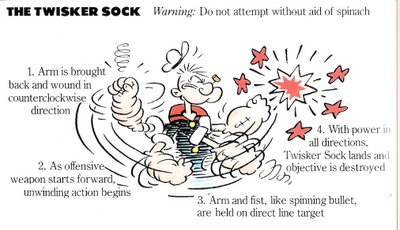 With this, no one will dast to risk your fisk.
With this, no one will dast to risk your fisk.
Click here to read more!
 With this, no one will dast to risk your fisk.
With this, no one will dast to risk your fisk.
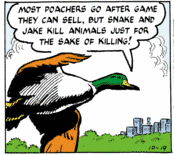 He's ready to lend a bill to help Mark Trail arrest a pair of dastardly poachers!
He's ready to lend a bill to help Mark Trail arrest a pair of dastardly poachers!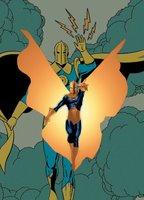 On a mostly unrelated note, I just found out that the upcoming Dr. Fate ongoing series will be written by Steve Gerber. The Gerb was responsible for some of the great whacked-out comics ever produced, including the recently-cancelled and damn fine book Hard Time. His fondness for the absurd, his gift for strange imagery, and his strong humanism should make the series a high point for DC.
On a mostly unrelated note, I just found out that the upcoming Dr. Fate ongoing series will be written by Steve Gerber. The Gerb was responsible for some of the great whacked-out comics ever produced, including the recently-cancelled and damn fine book Hard Time. His fondness for the absurd, his gift for strange imagery, and his strong humanism should make the series a high point for DC.[What about the] lower level of science villain who's smart and savvy enough to create technology powerful enough to at least temporarily go up against Spider-Man or Superman or Batman or the Flash, but doesn't cash in on it: what's his story, I always wonder? Why has the megalomania gotten in the way of him seeing that he just developed a dandy radioactive-powered ice gun for which world conglomerates would pay millions to lease or buy the technology, and instead decide to use it to rob the Second National Bank of Keystone City?
 Begin the day by donning your Invincible Battle Armor. Take to a stage in front of millions of your brainwashed minions. Bellow to them that you will destroy the world should the fools in Washington not accede to your all-too-reasonable demands. Tell your minions of their need to sacrifice themselves for your glory. Then shake your fists above your head in triumph as you cry out "WHO WILL DIE FOR ME?" and celebrate as those hapless millions scream their desire to end their lives simply to please you. Feel the world tremble in fear beneath your feet.
Begin the day by donning your Invincible Battle Armor. Take to a stage in front of millions of your brainwashed minions. Bellow to them that you will destroy the world should the fools in Washington not accede to your all-too-reasonable demands. Tell your minions of their need to sacrifice themselves for your glory. Then shake your fists above your head in triumph as you cry out "WHO WILL DIE FOR ME?" and celebrate as those hapless millions scream their desire to end their lives simply to please you. Feel the world tremble in fear beneath your feet.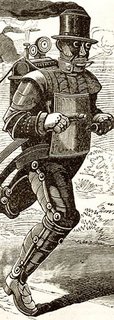 The finest explanation of villainy comes from a true American pioneer in the field. Henry David Thoreau stalked the forests of New England in the mid-nineenth century, clad in a green mask and tights. He called himself "The Verdant Caesar" and used a primitive robot, a "steam-boiler man" of his own construction, to attempt a conquest of Concord, Massachusetts.
The finest explanation of villainy comes from a true American pioneer in the field. Henry David Thoreau stalked the forests of New England in the mid-nineenth century, clad in a green mask and tights. He called himself "The Verdant Caesar" and used a primitive robot, a "steam-boiler man" of his own construction, to attempt a conquest of Concord, Massachusetts.I went to the woods because I wished to live villainously, to front only the essential facts of life, and see if I could not learn what it had to teach, and not, when I came to die, to discover that I had not lived.
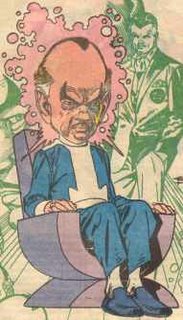 Not just in the figurative sense; it is also true in the strictly physical sense. According to current medical literature, my head fits in the technical category of "Epic Melon."
Not just in the figurative sense; it is also true in the strictly physical sense. According to current medical literature, my head fits in the technical category of "Epic Melon."Head growth in fetal life and infancy is associated with later intelligence, new research hints. Moreover, catch-up increases do not appear to compensate for poor early growth.
"Brain growth in early life may be important in determining not only the level of peak cognitive function attained but also whether such function is preserved in old age," the study team writes in the journal Pediatrics. "Older people with a larger head circumference tend to perform better on tests of cognitive function and may have reduced risks of cognitive decline and of Alzheimer's disease."
Several studies in children have shown that those with larger brains, measured with imaging studies or as head circumference, tend to score higher on tests of cognitive function. Similar associations have been found in adults.
For their study, Dr. Catharine R. Gale, of the University of Southampton, UK, and colleagues examined the effect of head growth in fetal life, infancy, and childhood on brain power at the ages of 4 and 8 years. Included in the study were 633 term children who had their head circumference measured at birth and at regular intervals thereafter.
By age 1, mean head circumference increased from 34.9 cm at birth to 46.6 cm. Head growth after infancy was slower. Mean head circumference increased to 50.9 cm by 4 years and to 53.4 cm by 8 years.
Average full-scale IQ was 106.3 at 4 years and 105.6 at 8 years. The investigators report that only prenatal growth and growth during infancy were associated with later IQ.
At 4 years, after adjusting for parental factors, there was an average increase in full-scale IQ of 2.41 points for each 1 standard deviation increase in head circumference at birth and 1.97 points for each 1-SD increase in head growth during infancy. This was conditional on head size at birth.
Head circumference at birth was no longer associated with IQ at 8 years. However, head growth during infancy remained significantly predictive, with full-scale IQ increasing an average of 1.56 points for each 1-SD increase in head growth.
SOURCE: Pediatrics October 2006.
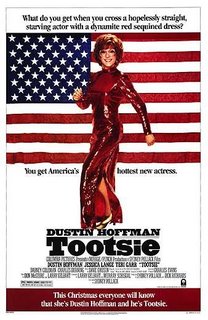 Something that would be super-cool to see in the upcoming Iron Man movie...
Something that would be super-cool to see in the upcoming Iron Man movie...
 The viola. Every team has one.
The viola. Every team has one.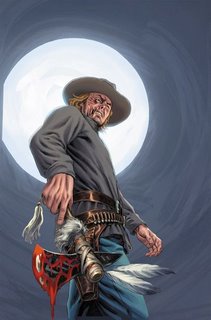 Jonah Hex was a killer. He’d kill to fulfill his job, and often he killed to carve out a little justice. Yet there’s a difference between him and the killer vigilantes of comics set in the modern era, such as the Punisher.
Jonah Hex was a killer. He’d kill to fulfill his job, and often he killed to carve out a little justice. Yet there’s a difference between him and the killer vigilantes of comics set in the modern era, such as the Punisher.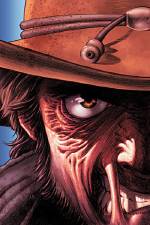 Hex’s world was filled with the greedy, the immoral and the amoral. Examples abound in his recent Showcase Presents volume. In one story, a cute, bumbling sheriff with a pretty little lady love sets off on the trail of violent thieves, joined by a protective Hex. In short order, Hex found that the sheriff was in on the gang’s crimes, seeing another woman on the side, and ready to kill Hex to keep it all secret. In another story, a young boy sold out Hex to a gang of killers for a quarter. A story about a corrupt tollbooth owner showed two children drown in swamp muck on-panel. Hex later finding the corpse of their mother rotting in a lime pit. It’s a cold, hard place, that West.
Hex’s world was filled with the greedy, the immoral and the amoral. Examples abound in his recent Showcase Presents volume. In one story, a cute, bumbling sheriff with a pretty little lady love sets off on the trail of violent thieves, joined by a protective Hex. In short order, Hex found that the sheriff was in on the gang’s crimes, seeing another woman on the side, and ready to kill Hex to keep it all secret. In another story, a young boy sold out Hex to a gang of killers for a quarter. A story about a corrupt tollbooth owner showed two children drown in swamp muck on-panel. Hex later finding the corpse of their mother rotting in a lime pit. It’s a cold, hard place, that West.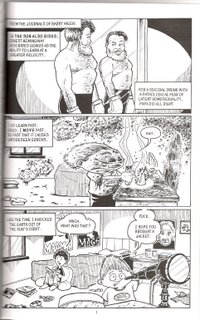

 Despite the superscience, aliens, and occasional cloning, Barry Ween is a hell of a lot closer to my childhood than Peanuts ever was.
Despite the superscience, aliens, and occasional cloning, Barry Ween is a hell of a lot closer to my childhood than Peanuts ever was.